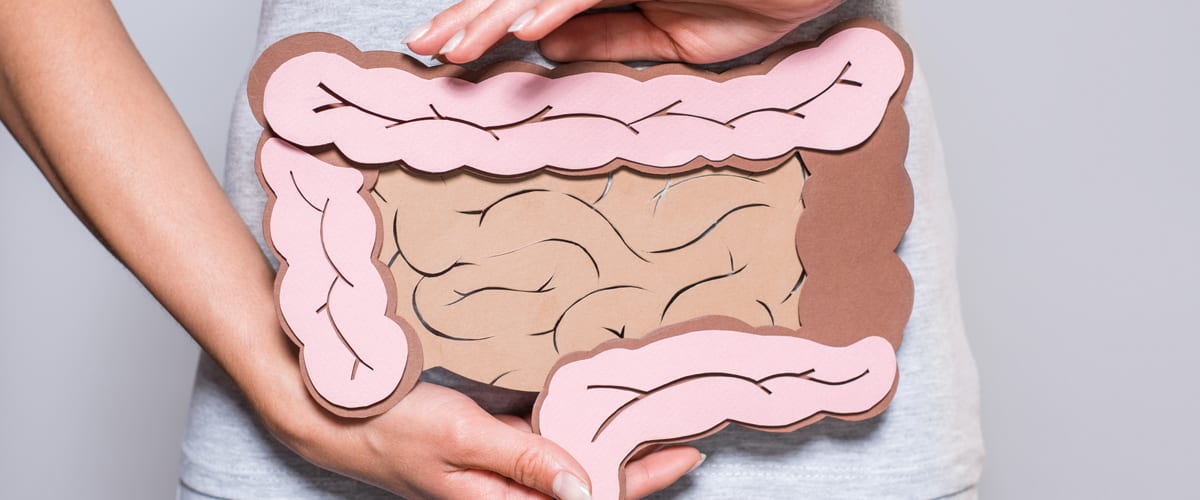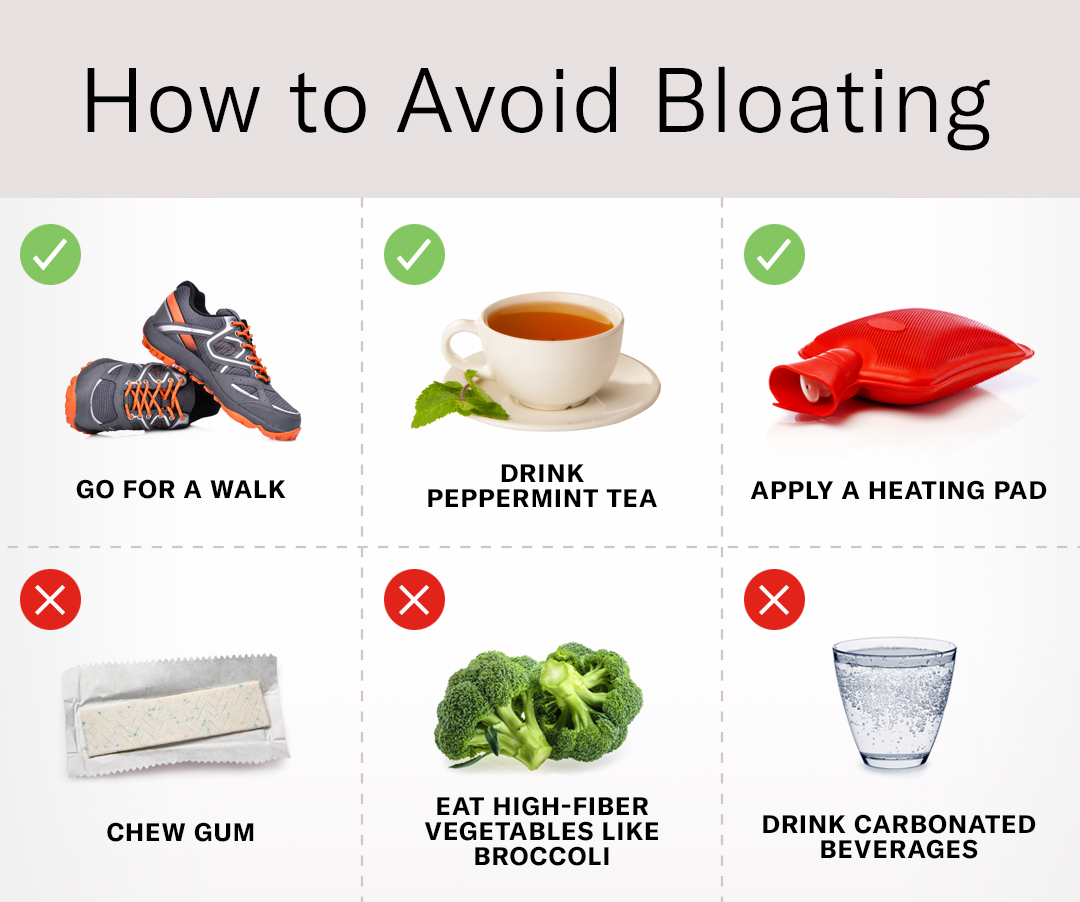How to Prevent Bloating
Everything you need to know about bloating — and how to avoid it.

We’ve all experienced it: that tight, bloated feeling after eating something that didn’t quite agree with our stomach, or after overindulging. Bloating is a common occurrence, especially during the holiday season, but what’s the real reason behind these uncomfortable moments? And could chronic bloating be a sign of something more serious?
Health Matters turned to Dr. Carolyn Newberry, a gastroenterologist and physician nutrition specialist at NewYork-Presbyterian/Weill Cornell Medical Center and an assistant professor of medicine at Weill Cornell Medicine, to get to the bottom of bloating, what causes it, and what to do about it.
What is bloating, and why does it occur?
Abdominal bloating occurs when the gastrointestinal (GI) tract becomes distended with gas. Signs and symptoms may include feelings of abdominal swelling, fullness, or hardness; excessive flatulence; gurgling; belching; and abdominal cramping.
Bloating may result from swallowing excessive air (eating too quickly, chewing gum, or eating while talking), eating certain foods, or introducing gas into the stomach through drinking carbonated beverages like soda. It also may result from difficulty passing stool, slow gut motility (the ability to move food through the GI tract), an infection in the GI tract, or increased sensitivity in the gut nerve endings through stress or anxiety.

Which foods make us prone to bloating?
What you eat may affect bloating symptoms, and some people have increased sensitivity to common foods. For example, we know specific carbohydrates, certain types of fiber, and dairy products are common triggers. This is due to poor digestion of these sugars in the small intestine, which leads to increased production of gas in the colon by bacteria, a process known as fermentation.
High-fiber vegetables like cauliflower, broccoli, and legumes (beans and lentils) are common triggers too, as the body has more difficulty breaking down the sugars in these vegetables, also known as oligosaccharides. Artificial sweeteners, sugar alcohols such as wine, and dairy products also can contribute to bloating symptoms. If someone is sensitive to dairy products, known as lactose intolerance, their symptoms may improve with the addition of the lactase enzyme, which is available as a supplement at your local drugstore.
Can food intolerance be a cause?
Absolutely. Food intolerances and food allergies can cause bloating, because when you are intolerant of a specific food, your body can’t break it down properly. This leads to bloating, excessive gas, changes in bowel habits, and a host of other symptoms. The most common culprits for food intolerances or allergies are lactose (a sugar in dairy products), fructose (a sugar in many fruits and veggies), eggs, soy, nuts, wheat, and other gluten-containing foods like barley and rye. If you think you may have a food allergy or an intolerance to certain foods, it’s important to see a doctor to identify which foods you are sensitive to and how best to avoid them.
What are some medical causes and how do you treat them?
Bloating is often caused by increased gas production or difficulty transporting gas within the GI tract, but it can also be a symptom of medical conditions, including delayed emptying of the stomach or small intestine, irritable bowel syndrome (IBS), small intestinal bacterial overgrowth (SIBO), dysbiosis (also called microbial imbalance), constipation, inflammatory bowel disease (IBD), pancreatic insufficiency (when the pancreas does not make enough of a specific enzyme to digest food), celiac disease, or intestinal obstruction, which is what happens when stool is prevented from passing normally through the bowel. In most cases, bloating can be treated by changing one’s diet. However, if you are diagnosed with any of the medical conditions listed above, your treatment will depend on the cause of the bloating.
Since there are many potential causes for abdominal bloating, it’s best that you speak to your doctor so they can rule out medical causes of your symptoms.
Dr. Carolyn Newberry
How do you treat motility problems in the GI tract?
For those with GI tract motility issues, changing the way you eat, including decreasing the size and increasing the frequency of meals, may help in conjunction with certain medications. People most likely to be affected by GI motility problems are those with a history of diabetes or surgery on the GI tract.
What if I’m diagnosed with an infection?
For an infected GI tract, bloating can be addressed with an antibiotic. A special type of infection in the small bowel, where excessive bacteria prevent normal absorption of nutrients (known as SIBO), is also treated with antibiotics or diet changes, or both.
What is IBS and how is it related to bloating?
IBS is a condition caused by increased sensitivity and abnormal functioning of the nerve endings in the gut, which may result in bowel habit changes, bloating, and abdominal pain. This condition often responds to elimination diets that focus on specific food triggers of bacterial fermentation, which in turn decreases bloating. Stress management and behavioral treatment are useful in some cases, as current literature supports a link between gut health and the brain. This has led researchers to examine how medications that alter brain chemistry affect GI symptoms like bloating, with some data showing this may help in certain patients.
What are prebiotics and probiotics, and do they help?
Prebiotics are a type of nondigestible product — usually a fiber — that supports the growth of gut bacteria. Probiotics are living bacteria that, when consumed, confer health benefits by increasing the diversity of gut bacteria. There isn’t enough evidence to routinely recommend prebiotic or probiotic supplements to address bloating. However, using these products may improve symptoms in some people. It’s important to check with your doctor or dietitian first before adding prebiotic or probiotic supplements to your diet.

Dr. Carolyn Newberry
What are the fastest ways to get rid of bloating?
Slowly sip water and, if you can, move around a bit. Going for a walk can get things moving in the right direction! Try sipping peppermint tea to aid in digestion, as studies have shown that peppermint oil can decrease the gut’s sensitivity to gas, and the tea can be a nice soothing remedy for the stomach. After getting up and moving around, applying a heating pad may help relieve pain. If your symptoms persist, it’s time to schedule an appointment with your doctor.
How can you avoid bloating altogether?
Avoid foods that cause bloating. A food diary where you log all your meals can come in handy when identifying which foods are causing you to bloat. Avoid carbonated beverages, chewing gum, and foods containing sugar alcohols (these end in -ol, such as sorbitol, mannitol, xylitol, or malitol), as these are poorly absorbed in the GI tract and thus subject to fermentation (i.e., gas!). Talk to a doctor or dietitian about taking digestive enzyme supplements or lactase, which may help break down indigestible carbohydrates.
If you suffer from bloating caused by IBS or bacterial overgrowth, a physician or registered dietitian may recommend a diet low in fermentable carbohydrates, called a low-FODMAP diet.
Because digestion begins in the mouth, eating slowly and chewing food well are also important to prevent bloating. To aid in digestion, aim to eat in a calm, relaxed environment. Try putting your fork down between bites so that you eat more mindfully, and thus, more slowly.
Since there are many potential causes for abdominal bloating, it’s best that you speak to your doctor so they can rule out medical causes of your symptoms and determine your optimal diet.
Learn more about digestive health or find a doctor.
Carolyn Newberry, M.D., is a gastroenterologist and physician nutrition specialist at NewYork-Presbyterian/Weill Cornell Medical Center and an assistant professor of medicine at Weill Cornell Medicine. Dr. Newberry’s primary clinical and research interests lie in defining the relationship between GI, nutrition, and obesity. She has published multiple review papers and original articles examining diet’s role in treating common gastrointestinal diseases, the link between malnutrition and gut pathology, and optimal therapy for obesity management.
